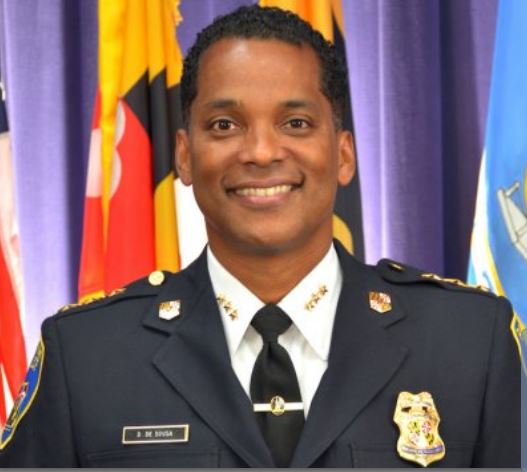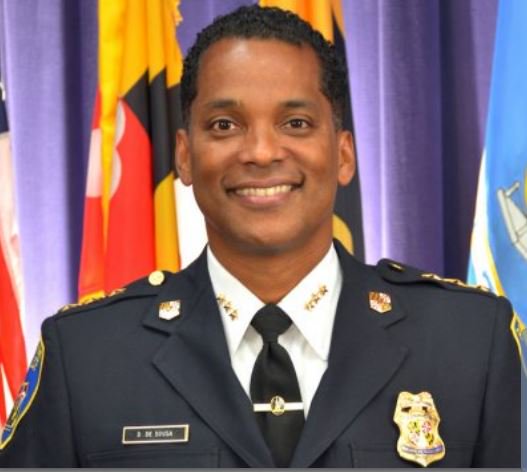[ad_1]
By Stephen Janis, Special to the AFRO
On the surface, the resignation of Baltimore police commissioner Darryl De Sousa seems like just another chapter in the sullied history of the Baltimore Police Department (BPD); the city’s top cop tarnished by charges that he failed to file tax returns for three years stepping aside to face federal criminal charges.
But behind the scenes there are some who say what is happening in public view only scratches the surface and that De Sousa’s downfall is a symptom of a deeply corrupt department that simply cannot right itself, let alone fight crime.

The AFRO interviewed half a dozen city leaders about the burgeoning scandal that has now engulfed a former police chief, who many felt possessed the skills to manage both the challenges of repairing community relations while tamping down violence. But, among them, there is not a consensus if the tax charges are just a personal lapse, or the sign that the ongoing series of scandals that have embroiled the department will continue to result in new, damaging revelations.
“This is really another black eye for the department,” said Baltimore City Councilman Kristopher Burnett (D-8).
“It very much could be that there is more we will find out.”
The three misdemeanors, filed as part of criminal information by federal prosecutors, allege DeSousa failed to file returns in 2013,2014, and 2015. It’s a crime that does not generally prompt charges let alone prosecution by federal law enforcement said a former FBI agent.
“That’s not the type of charge federal prosecutors usually pursue,” said former FBI Agent and director of the Homeland Security and Criminal Justice Institute of Anne Arundel Community College, Dr. Tyrone Powers. “I think they were trying to squeeze him.”
The WBAL-TV reported May 15 that federal prosecutors had issued subpoenas to the city finance department for records related to De Sousa’s work history going back almost a decade. The documents sought pay stubs, travel records, personnel files and internal investigations, WBAL reported.
There are concerns that the subpoenas coupled with the motions filed by prosecutors stating that De Sousa was under investigation for other federal crimes, is a sign of other charges are forthcoming. Particularly since the prosecutors handling De Sousa’s case are the same duo that brought down the Gun Trace Task Force.
“I think it has something to do with the (Gun Trace) Task Force, I really do,” BPD Sgt. Louis Hopson told the AFRO.
Indeed, the ongoing scandal over the actions of eight former officers of the once elite gun unit continues to cast a long shadow over a department currently under a federal consent decree.
The disgraced former plain clothes squad has either plead guilty or been convicted of dealing drugs, robbing residents, stealing overtime, and planting evidence. And it is that legacy of rampant corruption that continues to elicit doubts and fuel speculation that a string of federal indictments, which have exposed deep rooted corruption are far from over, DeSousa’s case included.
“It’s not a simple tax thing, if that’s it you’d have to prosecute half the city,” Hopson said. “I think there is more to it.”
After the tax charges against De Sousa were announced May 10, Mayor Catherine Pugh initially expressed support for her pick to lead the department. The next day the mayor suspended him and just a few days later De Sousa resigned. It’s a sequence of events Hopson says implies federal authorities have communicated with Pugh.
“I think the feds finally told the mayor what’s going on,” Hopson said.
Some who advise Pugh say the decision to suspend De Sousa was difficult for the mayor.
“I know she believes he was the best person to address the relationship between the department and community and reduce crime at the same time,” Powers said. “She is devastated by this.”
A spokesman for the mayor said she made the decision to seek De Sousa’s resignation gradually after conferring with other city officials.
“The Mayor was informed of this matter Thursday afternoon, as most others learned of it,” her spokesman James Bentley said in an email. Full disclosure: Bentley previously served as the AFRO’s associate editor.
“She deliberated further with all of the facts and with further discussion with Commissioner De Sousa, as well as with the City Solicitor and senior staff to arrive at the decision she announced on Friday.”
When asked specifically if the mayor had conferred with federal prosecutors, Bentley said no.
Some argue the mayor’s unilateral control over the BPD, coupled with the inability of a succession of city leaders to hold top commanders accountable, may have foreshadowed De Sousa’s downfall, especially for a department that was subject of a scathing justice department report which found systemic use of unconstitutional tactics targeted primarily against African-Americans.
“This should spark the conversation of local control of the BPD,” said Baltimore City Councilman Brandon Scott (D-2), who is also running for lieutenant governor.
In the past Scott has consistently touted civilian oversight of police. He has also sought legislation that would change the department from a state agency to city controlled. A move he said is needed now more than ever.
“There is not much the council can do to hold the department accountable from our perspective,” Scott said.
“We’re literally handcuffed.”
[ad_2]
Source link


